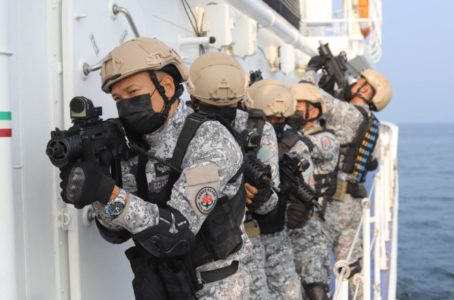Beijing cautions Manila against miscalculations as military tensions mount in disputed waters.
BEIJING: Chinese Foreign Minister Wang Yi has warned the Philippines to resolve its maritime issues with China through dialogue, stressing that any “miscalculation” in the South China Sea could prompt Beijing to take firm defensive actions. Wang’s warning came amid increasing tensions between the two countries over a series of confrontations at sea.
In recent months, both Beijing and Manila have exchanged sharp accusations. The Philippines has accused China’s coastguard of intentionally colliding with its vessels and using water cannons and military-grade lasers to harass them. Meanwhile, China has condemned the Philippines for what it calls unauthorized activities within its territory.
The deterioration of bilateral ties has coincided with the Philippines strengthening military relationships with Japan and the United States, its former colonial ruler and long-time defense ally. These developments have heightened Beijing’s concerns about the growing influence of external powers in the region.
“China-Philippines relations are at a crossroads,” Wang stated during a call with Philippine Foreign Minister Enrique Manalo on Wednesday (Dec 20). “The top priority is to properly handle and control the current maritime situation.” Wang warned that if the Philippines were to miscalculate or collaborate with “ill-intentioned” external forces, China would take action to protect its interests.
The dispute between China and the Philippines, which centers around the South China Sea’s rich fossil fuel reserves and fisheries, has simmered for years. The Philippines continues to push back against China’s growing presence, particularly in areas that it considers part of its exclusive economic zone (EEZ).
While an escalation to armed conflict remains unlikely, the situation is precarious. The United States is bound by a 1951 defense treaty with the Philippines, which could draw the U.S. into any confrontation that involves an attack on Philippine territory, including in the South China Sea.
Manalo, in his own statement, acknowledged the importance of ongoing dialogue, noting that the conversation had been “frank and candid.” He emphasized that both nations agreed on the need for continued communication to manage the maritime tensions.
China’s sweeping claims in the South China Sea are based on the so-called “nine-dash line,” which overlaps with the EEZs of several Southeast Asian nations, including the Philippines, Vietnam, Malaysia, Brunei, and Indonesia. In 2016, an international arbitration tribunal ruled that China’s claims have no legal basis, a verdict that Beijing has refused to recognize.
Despite the ruling, China has maintained a heavy coastguard presence and built militarized artificial islands in the disputed waters. Philippine President Ferdinand Marcos Jr. has responded by strengthening ties with the United States, including allowing expanded access to U.S. military bases, which has irked China. In addition, Manila’s defense officials have been vocal in their condemnation of China’s activities in the region, asserting that no country recognizes China’s maritime claims.
On Thursday, the Philippines announced that its military chief held talks with Japan’s top general to discuss regional security issues, with a focus on countering aggression in the South China Sea. This meeting underscores the Philippines’ commitment to building stronger alliances and advancing a rules-based international order in the Indo-Pacific.
As tensions persist, both sides remain engaged in a high-stakes diplomatic struggle over one of the world’s most important and contested maritime regions.








